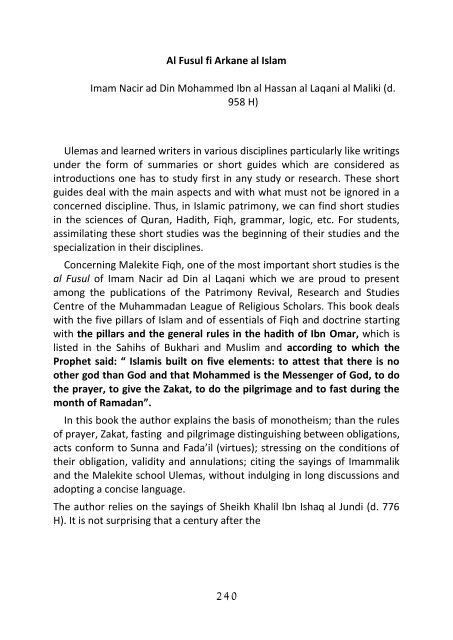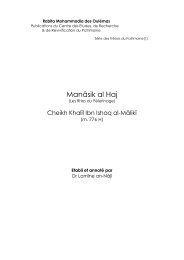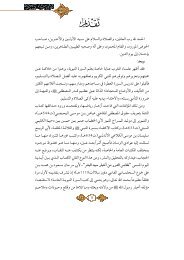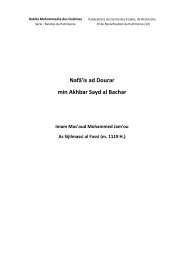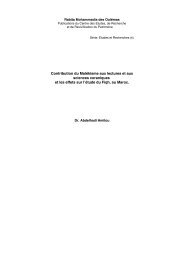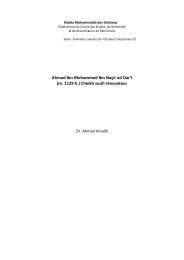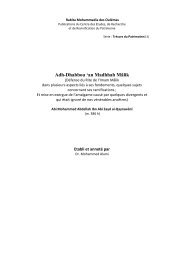Al Fouçoul fi Arkane al Islam
Al Fouçoul fi Arkane al Islam
Al Fouçoul fi Arkane al Islam
You also want an ePaper? Increase the reach of your titles
YUMPU automatically turns print PDFs into web optimized ePapers that Google loves.
<strong>Al</strong> Fusul <strong>fi</strong> <strong>Arkane</strong> <strong>al</strong> <strong>Islam</strong><br />
Imam Nacir ad Din Mohammed Ibn <strong>al</strong> Hassan <strong>al</strong> Laqani <strong>al</strong> M<strong>al</strong>iki (d.<br />
958 H)<br />
Ulemas and learned writers in various disciplines particularly like writings<br />
under the form of summaries or short guides which are considered as<br />
introductions one has to study <strong>fi</strong>rst in any study or research. These short<br />
guides de<strong>al</strong> with the main aspects and with what must not be ignored in a<br />
concerned discipline. Thus, in <strong>Islam</strong>ic patrimony, we can <strong>fi</strong>nd short studies<br />
in the sciences of Quran, Hadith, Fiqh, grammar, logic, etc. For students,<br />
assimilating these short studies was the beginning of their studies and the<br />
speci<strong>al</strong>ization in their disciplines.<br />
Concerning M<strong>al</strong>ekite Fiqh, one of the most important short studies is the<br />
<strong>al</strong> Fusul of Imam Nacir ad Din <strong>al</strong> Laqani which we are proud to present<br />
among the publications of the Patrimony Reviv<strong>al</strong>, Research and Studies<br />
Centre of the Muhammadan League of Religious Scholars. This book de<strong>al</strong>s<br />
with the <strong>fi</strong>ve pillars of <strong>Islam</strong> and of essenti<strong>al</strong>s of Fiqh and doctrine starting<br />
with the pillars and the gener<strong>al</strong> rules in the hadith of Ibn Omar, which is<br />
listed in the Sahihs of Bukhari and Muslim and according to which the<br />
Prophet said: “ <strong>Islam</strong>is built on <strong>fi</strong>ve elements: to attest that there is no<br />
other god than God and that Mohammed is the Messenger of God, to do<br />
the prayer, to give the Zakat, to do the pilgrimage and to fast during the<br />
month of Ramadan”.<br />
In this book the author explains the basis of monotheism; than the rules<br />
of prayer, Zakat, fasting and pilgrimage distinguishing between obligations,<br />
acts conform to Sunna and Fada’il (virtues); stressing on the conditions of<br />
their obligation, v<strong>al</strong>idity and annulations; citing the sayings of Imamm<strong>al</strong>ik<br />
and the M<strong>al</strong>ekite school Ulemas, without indulging in long discussions and<br />
adopting a concise language.<br />
The author relies on the sayings of Sheikh Kh<strong>al</strong>il Ibn Ishaq <strong>al</strong> Jundi (d. 776<br />
H). It is not surprising that a century after the<br />
240


